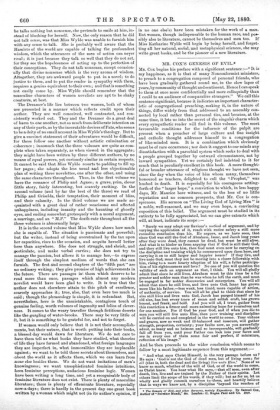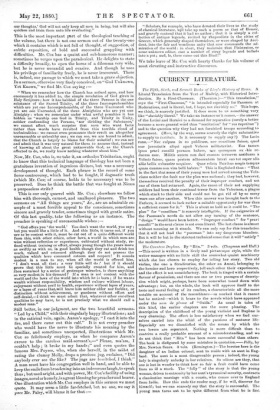MIL COX'S GENESIS OF EVIL.* Mn. Con begins his preface
with a significant sentence :—" It is my happiness, as it is that of many Nonconformist ministers, to preach to a congregation composed of personal friends, who have been gradually gathered round me, in the slow lapse of years, by community of thought and sentiment. Hence I can speak to them at once more confidentially and more colloquially than I could to an audience of comparative strangers." We call this sentence significant, because it indicates an important character- istic of congregational preaching, making it, in the nature of things, differ widely from that addressed to an assembly con- nected by local rather than personal ties, and because, at the same time, it lets us into the secret of the singular charm which every sympathetic reader will find in this volume. The most favourable conditions for the influencb of the pulpit are present when a preacher of large culture and fine insight and catholic thought addresses himself to a congregation of like-minded men. It is a combination which obviously must be of rare occurrence; nor does it suggest to our minds any dissatisfaction with a parochial system which seeks to deal with a people grouped together by outward circumstances, not by inward sympathies. Yet we certainly feel indebted to it for much that is peculiarly excellent in this book. A more thought- ful or broader utterance of religions thought we have not seen, since the day when the voice of him whom many, themselves honoured as teachers, delighted to call the "-Prophet," was hushed in death. It is especially for his courageous setting- forth of the "larger hope," a conviction to which, in less happy days, Mr. Maurice bore witness, and to the loss of no little reputation and no common prospects, that Mr. Cox is con- spicuous. His sermon on "The Living God of Living Men" is a noble, well-reasoned, and we may even hope, a convincing exposition of this belief. The argument must be studied in its entirety to be fully appreciated, but we can give extracts which will, at least, indicate its scope :—
"Surely we may adopt our Saviour's method of argument, and by varying the application of it, reach with entire safety a still more recondite conclusion than his. He argues, as we have seen, that since God was still the God of Abraham, Isaac, and Jacob long years after they were dead, they cannot be dead, but must be still alive. And what is to hinder us from arguing that if God is still their God, and they still live unto him, then God must even now be carrying on the disbipline and training whigh he commenced upon them here, and carrying it on to still larger and happier issues ? If they live, and Jive unto God, must they not be moving into a closer fellowship with him, rising to a more hearty adoption of his will, a fuller participa- tion of his righteousness and love ? No one of you will question the validity of such an argument as that, I think. You will all gladly admit that since he still lives, Abraham must by this time be a far greater and nobler man than he was when he left the earth, and must be engaged in far nobler discoveries and enterprises. You will all admit that since he still lives, and lives unto God, Isaac has grown more like his father,—less weak, less timid, more capable of action, of authority, of service. You will all be glad to think that since he also still lives and lives unto God, Jacob has purged himself of his old sins, has lost every trace of mean and selfish craft, has grown honest, and frank, and bold. And you will all, I trust, gather from this conviction a firmer and more animating hope for yourselves and for one another. For if God be your God, and if when you die to men you will still live unto Him, then your training and discipline will be carried on and completed in the world to come. Your virtues and graces, now so weak and ill-balanced and insecure, will gather strength, proportion, certainty; your faults now, as you sorrowfully admit, so many and so heinous and so inconquerable, will gradually fall off from you, until your Father can look into your faces and see in every one of them some fair and perfect, if miniature, reflection of his image."
And he then proceeds to the wider conclusion which seems to follow by a most legitimate sequence from this argument :—
"And what says Christ Himself, in the very passage before us ? He Bays: God is not the God of dead men, but of living men ; for all (that is, both the dead and the living) live unto Him.' None of us know so much, whether of the will of God, or of the world to come, as Christ knew. You hear what He says,—that all men, even after death, live, live and are trained by the Father of their spirits. Let others limit the scope of his words, if they will ; but as for us, let us wholly and gladly commit ourselves to .them, and heartily believe that in ways we know not, by a discipline 'beyond the reaches of • The Genesis of Evil. and other Sermons, 'minty Expository. By Samuel Cox. Author of " fhavasor Mundt," au. Loudon 0. Kegau Paul and Co. 1860.
our thoughts,' God will not only keep all men in being, but will also 'quicken and train them unto life everlasting."
This is the most important part of the theological teaching of -the volume, but there is not one sermon out of the twenty-one -which it contains which is not full of thought, of suggestion, of
subtle exposition, of bold and successful grappling with difficulties. Mr. Cox has a quaint and sub-humorous manner;
sometimes he verges upon the paradoxical. He delights to state a difficulty broadly, to open the horns of a dilemma very wide, but he is never uncandid and evasive. And though he uses his privilege of familiarity freely, he is never irreverent. There is, indeed, one passage to which we must take a grave objection. In a sermon, otherwise very finely conceived, on" God Unknown, Yet Known," we find Mr. Cox saying :— "When we remember how the Church has refined upon, and how enormously it has added to, the simple revelation of God given in Holy Scripture ; how it has babbled of the three Persons in the one substance of the Sacred TiMity, of the three Imcomprehensibles which are yet one Incomprehensible, of the three Uncreated who yet are one Uncreated, of the three Almighties who are yet one Almighty : when we remember under what awful penalties it has bidden us worship one God in Trinity, and Trinity in Unity, neither confounding the Persons, nor dividing the Substance,' we cannot affect mach surprise that men who want facts rather than words have revolted from this terrible cloud of technicalities : we cannot even pronounce their revolt an altogether unreasonable or unhealthy one ; we can see, we are bound to admit, that the Church is largely to blame for their unbelief ; we can see and admit that it was very natural for them to assume that, instead of knowing all about the great unknowable God, as the Church affected to do, we really know nothing whatever about him."
Now, Mr. Cox, who is, we take it, an orthodox Trinitarian, ought to know that this technical language of theology has not been a
gratuitous invention of ingenious divines, but was a necessary development of thought. Each phrase is the record of some fierce controversy, which had to be fought, if dogmatic truth (which Mr. Cox; of course, holds to be necessary) was to be preserved. Does he think the battle that was fought at Niccea a purposeless strife P This is our only quarrel with Mr. Cox ; elsewhere we follow him with thorough, earnest, and unalloyed pleasure. The two sermons on "All things are yours," &c., are an admirable ex- ample of a most forcible appeal to the conscience, sometimes sincere and gravely tender, sometimes tinged with gentle satire.
Of this last quality, take the following as an instance. The preacher is speaking of unreasonable wishes :—
"God offers you 'the world.' You don't want the world, you say ; but you would like a little of it. And this little, it turns out, if you are to be content with it, must be cut out of a quite different world from this, with other ethics, other laws, a world in which men are wise without reflection or experience, cultivated without study, re- fined without training or effort, always young though the years move as swiftly as with us, in good health though they oat and drink too much, valued and esteemed although they do not possess the qualities which hero command esteem and respect ! It sounds modest in a man to say, when all the world is offered him, I don't want all that ; a very little will do :' but if it should prove that this little must be specially created for him, and then sustained by a series of grotesque miracles, is there anything so very modest in his demand ? If a man is not content with the world and the laws of the world into which he is born ; if he wants wealth without responsibility, wisdom and culture without labour, enjoyment without peril to health, experience without lapse of years, or a lapse of years that.will leave him neither older nor feebler, or distinction without achievement, or goodness without effort and self-denial,—I think we must admit that, whatever other excellent qualities he may have, be is not precisely what we should call a modest man."
Still better, in our judgment, are the two beautiful sermons, "Led by a Child," with their singularly happy illustrations; and
in the satirical vein, again, Aaron's apology, "I cast it into the fire, and there came out this calf." It is not every preacher
who would have the nerve to illustrate his meaning by the familiar, and sometimes unexpected, illustrations which Mr.
Cox so felicitously employs, as when he compares Aaron's excuse to the careless maid-servant's,—" Please, ma'am, I couldn't help ; it broke in my hands ;" and even quotes the famous Mrs. Puffer, who, when she herself, in the midst of
rating the clumsy Molly, drops a precious jug, exclaims, "Did anybody ever see the like? The jugs are bewitched, I think." A man must have his congregation well in hand, and be able to keep the smile from broadening into an indecorous laugh, to speak thus ; but used aright, and with power, Mr. Cox's facility of using images, novel or h omely, is a great blessing for preacher and hearer. One illustration which Mr. Cox employs in this sermon we must quote. it may seem a little far-fetched, but no one, we say it pace Mr. Paley, will blame it for that :—
" Scholars, for example, who have devoted their lives to the study of classical literature, wjll take up such a poem as that of Homer, and gravely contend that it had no author ; that it is simply a col- lection of antique legends, recited by rhapsodists in the cities of Greece, which generally shaped themselves, or wore shaped by Acci- dent, into the fair and wondrous unity that now commands the ad- miration of the world : in short, they maintain that Pisistratus, or some unknown editor, cast a number of stray legends and ballads into a pot; and, lo, there catne out this Iliad !"
We take leave of Mr. Cox with hearty thanks for his volume of most elevating and instructive discourses.



































 Previous page
Previous page